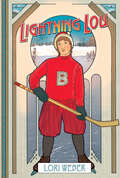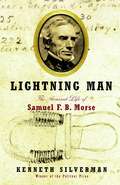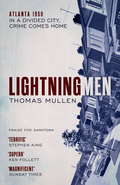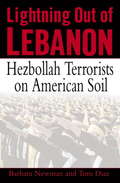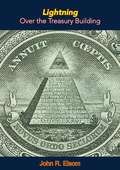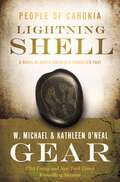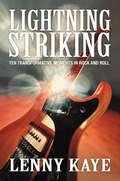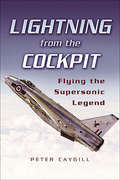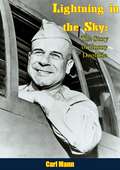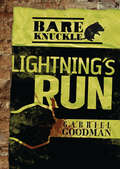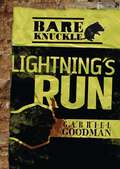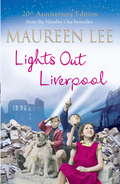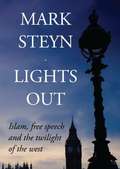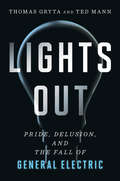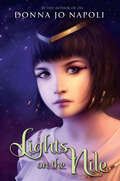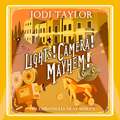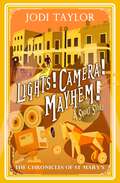- Table View
- List View
Lightning Lou
by Lori WeberWhen a team in an all-girls’ hockey league comes to recruit players, twelve-year-old Lou’s dreams seem to be coming true. But the dreams hinge on one thing: never letting on that Lou is a boy. But the road to stardom is not easy, as Lou discovers that the competition is fierce, and that he’s got a lot of work to do to match the skills of the league’s star player and his chief rival, Albertine Lapensée. All the while, he has to keep his secret, and wrestle with the moral dilemma of taking a place on the team away from a deserving girl. Loosely based on a true story, Lightning Lou is a riveting and thought-provoking story for middle-grade readers.
Lightning Man: The Accursed Life of Samuel F. B. Morse
by Kenneth SilvermanIn this brilliantly conceived and written biography, Pulitzer Prize winning Kenneth Silverman gives us the long and amazing life of the man eulogized by the New York Herald in 1872 as perhaps the most illustrious American of his age. Silverman presents Samuel Morse in all his complexity. There is the gifted and prolific painter (more than three hundred portraits and larger historical canvases) and pioneer photographer, who gave the first lectures on art in America, became the first Professor of Fine Arts at an American college (New York University), and founded the National Academy of Design. There is the republican idealist, prominent in antebellum politics, who ran for Congress and for mayor of New York. But most important, there is the inventor of the American electromagnetic telegraph, which earned Morse the name Lightning Man and brought him the fame he sought. In these pages, we witness the evolution of the great invention from its inception as an idea to its introduction to the world--an event that astonished Morse's contemporaries and was considered the supreme expression of the country's inventive genius. We see how it transformed commerce, journalism, transportation, military affairs, diplomacy, and the very shape of daily life, ushering in the modern era of communication. But we discover as well that Morse viewed his existence as accursed rather than illustrious, his every achievement seeming to end in loss and defeat: his most ambitious canvases went unsold; his beloved republic imploded into civil war, making it unlivable for him; and the commercial success of the telegraph engulfed him in lawsuits challenging the originality and ownership of his invention. Lightning Man is the first biography of Samuel F. B. Morse in sixty years. It is a revelation of the life of a fascinating and profoundly troubled American genius.
Lightning Men (Darktown #Bk. 2)
by Thomas Mullen'A brilliant blending of crime, mystery, and American history. Terrific entertainment' Stephen King on DarktownLightning Men follows the multi-award-nominated, highly acclaimed crime debut Darktown into a city on the brink of huge and violent change - and full of secrets. Atlanta, 1950. Crime divides, the fight unites. Officer Denny Rakestraw and 'Negro Officers' Lucius Boggs and Tommy Smith face the Klan, gangs and family warfare in a rapidly changing Atlanta.Black families - including Smith's sister and brother-in-law - are moving into Rake's formerly all-white neighbourhood, leading his brother-in-law, a proud Klansman, to launch a scheme to 'save' their streets. When those efforts leave a man dead, Rake is forced to choose between loyalty to family or the law. Meanwhile, Boggs has outraged his preacher father by courting a domestic, whose dangerous ex-boyfriend is then released from prison. As Boggs, Smith, and their all-black precinct contend with violent drug dealers fighting for turf in new territory, their personal dramas draw them closer to the fires that threaten to consume Atlanta once again. Praise for Thomas Mullen 'Magnificent and shocking' Sunday Times'Written with a ferocious passion that'll knock the wind out of you' New York Times
Lightning Out of Lebanon: Hezbollah Terrorists on American Soil
by Tom Diaz Barbara NewmanBefore September 11, 2001, one terrorist group had killed more Americans than any other: Hezbollah, the "Party of God." Today it remains potentially more dangerous than even al Qaeda. Yet little has been known about its inner workings, past successes, and future plans--until now. Written by an accomplished journalist and a law-enforcement expert, Lightning Out of Lebanon is a chilling and essential addition to our understanding of the external and internal threats to America. In disturbing detail, it portrays the degree to which Hezbollah has infiltrated this country and the extent to which it intends to do us harm. Formed in Lebanon by Iranian Revolutionary Guards in 1982, Hezbollah is fueled by hatred of Israel and the United States. Its 1983 truck-bomb attack against the U.S. Marine barracks in Beirut killed 241 soldiers--the largest peacetime loss ever for the U.S. military--and caused President Reagan to withdraw all troops from Lebanon. Since then, among other atrocities, Hezbollah has murdered Americans at the U.S. embassy in Lebanon and the Khobar Towers U.S. military housing complex in Saudi Arabia; tortured and killed the CIA station chief in Beirut; held organizational meetings with top members of al Qaeda-including Osama bin Laden-and established sleeper cells in the United States and Canada. Lightning Out of Lebanon reveals how, starting in 1982, a cunning and deadly Hezbollah terrorist named Mohammed Youssef Hammoud operated a cell in Charlotte, North Carolina, under the radar of American intelligence. The story of how FBI special agent Rick Schwein captured him in 2002 is a brilliantly researched and written account. Yet the past is only prologue in the unsettling odyssey of Hezbollah. Using their exclusive sources in the Middle East and inside the U.S. counterterrorism establishment, the authors of Lightning Out of Lebanon imagine the deadly future of Hezbollah and posit how best to combat the group which top American counterintelligence officials and Senator Bob Graham, vice-chairman of the Senate Intelligence Committee, have called "the A Team of terrorism."
Lightning Over the Treasury Building: An Expose Of Our Banking And Currency Monstrosity, America's Most Reprehensible And Un-american Racket
by John R. ElsomA clear and concise treatise of the banking and money system of the United States as manipulated by the international bankers, by whom governments are controlled, wars promoted, peoples exploited and the real wealth of the nation gathered unto themselves through the process of mortgage and foreclosure—together with a constitutional remedy for our national dilemma.
Lightning Shell: A People of Cahokia Novel (North America's Forgotten Past #27)
by W. Michael Gear Kathleen O'Neal GearLightning Shell marks the dramatic conclusion to the People of Cahokia sub-series by bestselling authors W. Michael and Kathleen O'Neal Gear.Spotted Wrist’s squadrons are about to launch an assault on Evening Star Town. Meanwhile, the new Keeper’s loyal squadrons have taken control of central Cahokia.Blue Heron’s enemies have declared her dead, a supposed victim of the fire that consumed her palace. She’s alive and in the end it will be her wits, Seven Skull Shield’s licentious cunning, and a desperate gamble that determine who lives and who dies in Cahokia.Meanwhile, in the distant east, a desperate three-way race is underway. Walking Smoke—the Lightning Shell witch—hastens to make his way back to Cahokia, understanding that the cure for his impotence lies atop Morning Star’s Mound.Night Shadow Star means to stop him before he can get to Morning Star. Following in her wake, Fire Cat is merciless. He will stop at nothing to ensure that it is he, not Night Shadow Star, who pays the ultimate price.The final showdown will shake Cahokia to its roots, and nothing will be the same again.At the Publisher's request, this title is being sold without Digital Rights Management Software (DRM) applied.
Lightning Sky: A U.S. Fighter Pilot Captured during WWII and His Father's Quest to Find Him
by R.C. GeorgeA U.S. fighter pilot captured by the enemy. A father determined to rescue his son. One of the most remarkable and moving true stories of faith and perseverance to come out of World War II. October 6, 1944. Twenty-year-old Army Air Corps Second Lieutenant David “Mac” Warren MacArthur was on a strafing mission over Greece when a round of 88-mm German anti-aircraft flak turned his P-38 Lightning into a comet of fire and smoke. Dave parachuted to safety as the Lightning lived up to her name and struck the Adriatic Sea like a bolt of flames. In minutes, he was plucked from the water—only to find himself on the wrong end of a German rifle pointing straight at his head. Dave’s father, Lieutenant Colonel Vaughn MacArthur, was a chaplain with the 8th Armored Division of Patton’s Third Army when he learned of his son’s capture. He made it his personal mission to find him. For the duration of the war, as Dave was shuttled from camp to camp—including Dachau—his father never stopped searching. Then in May 1945, Vaughn’s last hope was Stalag VII-A in Moosburg, Germany. Through the barbed wire fence, he cried out his son’s name. Incredibly, out of tens of thousands of POWs, one of them, squinting into the sunlight, turned and smiled. Father and son spent the next two weeks together celebrating, a forever cherished memory. Over the next twenty-five years, Dave would go on to honor his father on rescue missions of his own, becoming a highly decorated and genuine American war hero. In both Korea and Vietnam, Dave would carry with him the legacy of a great man who gave everything to save his son. An inspiring, harrowing, and unforgettable chronicle of love of family and love of country, Lightning Sky is a timeless testament to extraordinary lives in extraordinary times.
Lightning Striking
by Lenny Kaye'A true testimonial and epic love letter to the soul saving power of rock & roll . . . Read it and be inspired, as I was' Bobby Gillespie'Lenny Kaye has illuminated ten facets of the jewel called rock and roll from a uniquely personal and knowledgeable perspective. He draws from a lifetime of inspiration and experience. A youth plugging in his first electric guitar, a fan taking the dance floor, a propelling player, a humble guardian of history, and the writer I have always known him to be' Patti SmithMemphis, 1954. New Orleans 1957. Philadelphia 1959. Liverpool, 1962. San Francisco 1967. Detroit 1969. New York, 1975. London 1977. Los Angeles 1984 / Norway 1993. Seattle 1991.Rock and roll was birthed in basements and garages, radio stations and dance halls, in cities where unexpected gatherings of artists and audience changed and charged the way music is heard and celebrated, capturing lightning in a bottle. Musician and writer Lenny Kaye explores ten crossroads of time and place that define rock and roll, its unforgettable flashpoints, characters and visionaries, how each generation came to be, how it was discovered by the world. Whether Elvis Presley's Memphis, the Beatles' Liverpool, Patti Smith's New York or Kurt Cobain's Seattle, LIGHTNING STRIKING reveals the communal energy that creates a scene, a guided tour inside style and performance, to see who's on stage, along with the movers and shakers, the hustlers and hangers-on, and why everybody is listening. Grandly sweeping and minutely detailed, informed by Kaye's acclaimed knowledge and experience as a working musician, LIGHTNING STRIKING is an ear-opening insight into our shared musical and cultural history, a carpet ride of rock and roll's most influential movements and moments.
Lightning Striking
by Lenny KayeMemphis, 1954. New Orleans 1957. Philadelphia 1959. Liverpool, 1962. San Francisco 1967. Detroit 1969. New York, 1975. London 1977. Los Angeles 1984 / Norway 1993. Seattle 1991. <p><p>Rock and roll was birthed in basements and garages, radio stations and dance halls, in cities where unexpected gatherings of artists and audience changed and charged the way music is heard and celebrated, capturing lightning in a bottle. Musician and writer Lenny Kaye explores ten crossroads of time and place that define rock and roll, its unforgettable flashpoints, characters and visionaries, how each generation came to be, how it was discovered by the world. <p><p>Whether Elvis Presley's Memphis, the Beatles' Liverpool, Patti Smith's New York or Kurt Cobain's Seattle, LIGHTNING STRIKING reveals the communal energy that creates a scene, a guided tour inside style and performance, to see who's on stage, along with the movers and shakers, the hustlers and hangers-on, and why everybody is listening. Grandly sweeping and minutely detailed, informed by Kaye's acclaimed knowledge and experience as a working musician, LIGHTNING STRIKING is an ear-opening insight into our shared musical and cultural history, a carpet ride of rock and roll's most influential movements and moments.
Lightning Striking: Ten Transformative Moments in Rock and Roll
by Lenny Kaye“We have performed side-by-side on the global stage through half a century…. In Lightning Striking, Lenny Kaye has illuminated ten facets of the jewel called rock and roll from a uniquely personal and knowledgeable perspective.” –Patti SmithAn insider’s take on the evolution and enduring legacy of the music that rocked the twentieth centuryMemphis, 1954. New Orleans 1957. Philadelphia 1959. Liverpool, 1962. San Francisco 1967. Detroit 1969. New York, 1975. London 1977. Los Angeles 1984 / Norway 1993. Seattle 1991.Rock and roll was birthed in basements and garages, radio stations and dance halls, in cities where unexpected gatherings of artists and audience changed and charged the way music is heard and celebrated, capturing lightning in a bottle. Musician and writer Lenny Kaye explores ten crossroads of time and place that define rock and roll, its unforgettable flashpoints, characters and visionaries, how each generation came to be, how it was discovered by the world. Whether describing Elvis Presley’s Memphis, the Beatles’ Liverpool, Patti Smith’s New York or Kurt Cobain’s Seattle, Lightning Striking reveals the communal energy that creates a scene, a guided tour inside style and performance, to see who’s on stage, along with the movers and shakers, the hustlers and hangers-on, and why everybody is listening. Grandly sweeping and minutely detailed, informed by Kaye’s acclaimed knowledge and experience as a working musician, Lightning Striking is an ear-opening insight into our shared musical and cultural history, a carpet ride of rock and roll’s most influential movements and moments.
Lightning Up: The Career of Air Vice-Marshal Alan White CB AFC FRAeS RAF
by Alan WhiteAlan White served in the RAF from 1953 to 1987 roughly the period of the Cold War. His introduction to flying came in his University Air Squadron. This seduced him into dropping out of University and joining the RAF. He initially had success during the piston-engine stages of his training but damage to a Vampire T11 and a bad start on the Hunter Weaponry Course set his confidence back until he recovered during service with his first Hunter Squadron. The infamous Duncan Sandys' cuts of 1957 caused the closure of his squadron and he found himself towing air-to-air gunnery targets, but luckily he was then moved to instruct on the Hunter Operational Conversion Unit where he developed his solo aerobatic display skills. He was then posted to take Hunters to Singapore and form a Squadron. He became involved with the SEATO response to assist the Thai governments request against communist insurgents from Laos and spent five months at Chiang Mai camping in a paddy field. After attending Staff College he was posted to Aden at a time of growing terrorist activity. He worked with the C-in-C, Admiral Sir Michael Le Fanu. Upon his return to the UK he trained to fly the supersonic Lightning fighter and eventually was promoted to lead a squadron. There followed a period of rapid promotion and he became Station Commander at RAF Leuchars. His later appointments as Air Commodore included Director of Operations (Air Defence), Senior Staff Officer HQ 11 Group, Air Commodore Plans at HQ Strike Command (where he assisted in the Falklands conflict) until he was promoted to his final rank and appointed Deputy Commander RAF Germany and then finally he became Commandant, RAF Staff College. His account is full of interesting flying detail and the internal workings of the RAF during those dangerous Cold War days.
Lightning from the Cockpit: Flying the Supesonic Legend (Aviation Ser.)
by Peter CaygillThe English Electric Lightning was the only single-seat supersonic interceptor fighter designed and manufactured in the UK. It saw service with the RAF in the sixties and seventies and gained a worthy reputation for its speed ( in excess of Mach 2 ) and phenomenal rate of climb. It was, however, a not entirely reliable aeroplane and over fifty were lost during its operational career. In this book, the author has gathered together 16 personal accounts of what it was like to fly the Lightning, thrilling stories that convey the immense brute power of the machine and also its many pitfalls. It will enthrall the enormous following the aircraft still enjoys. Two are now flying in South Africa and four are being restored to flight-worthy condition in the UK. To see a Lightning take off and climb vertically until it vanishes into the sky is one of the most spectacular sights in aviation.
Lightning in the Sky: The Story of Jimmy Doolittle
by Carl MannOriginally published in 1943, this is a biography of Jimmy Doolittle (1896-1993), a highly decorated officer in the United States Army Air Corps who pioneered in all phases of aeronautical achievement and commanded the Doolittle Raid on Japan during World War II.He became the first pilot to take the "blind" out of flying and complete the "outside loop", set numerous speed records, and won many racing trophies. Promoted to lieutenant general, he was also awarded the Medal of Honor for his valor and leadership as commander of the Doolittle Raid, a bold long-range retaliatory air raid on the Japanese main islands weeks after the attack on Pearl Harbor. His Tokyo flight is widely regarded as one of the coups of the Second World War.Doolittle also commanded the 12th Air Force over North Africa, the 15th Air Force over the Mediterranean, and the 8th Air Force over Europe.
Lightning's Run (Bareknuckle Ser.)
by Gabriel GoodmanHiram's father forbids violence. It's against their family's beliefs. Even so, Hiram has been sneaking out to the Woodrat Club, where bareknuckle fighters compete and shady deals go down. Tired of beatings from a local bully, Hiram wants to learn how to box. He finds a willing teacher in Lightning, one of the Woodrat's finest fighters. Hiram, a Jewish immigrant, and Lightning, a former slave, soon form an unlikely friendship. But Lightning has troubles of his own. When a man from Lightning's past appears in New York, will Hiram's new boxing skills be enough to help his friend?
Lightning's Run (Bareknuckle)
by Gabriel GoodmanHiram's father forbids violence. It's against their family's beliefs. Even so, Hiram has been sneaking out to the Woodrat Club, where bareknuckle fighters compete and shady deals go down. Tired of beatings from a local bully, Hiram wants to learn how to box. He finds a willing teacher in Lightning, one of the Woodrat's finest fighters. Hiram, a Jewish immigrant, and Lightning, a former slave, soon form an unlikely friendship. But Lightning has troubles of his own. When a man from Lightning's past appears in New York, will Hiram's new boxing skills be enough to help his friend?
Lights Along the Way: Great Stories of American Faith
by Thomas J. FlemingOur history books are full of important episodes in America's past, and of general biographies of those who have made that history. Rarely do they record, however, how an individual's faith shaped those events. Here, filling in the missing pieces, are thirty-seven portraits of defining moments in American religious history ranging from the Pilgrims to contemporary figures, including: Samuel Sewall, Ben Franklin, George Washington, Johnny Appleseed, Sojourner Truth, Emily Dickinson, Robert E. Lee, Woodrow Wilson, Dorothy Day, Bess Truman, John F. Kennedy, and others.
Lights Out Liverpool: (Pearl Street 1)
by Maureen LeeNumber One bestseller Maureen Lee's first novel of the hugely popular Pearl Street series.As Britain stands alone against a monstrous enemy, the inhabitants of Pearl Street, in Liverpool, face hardship and heartbreak with courage and humour.The war touches each of them in a different way: for Annie Poulson, a widow, it means never-ending worry when her twin boys are called up and sent to France; Sheila Reilly's husband, Cal, faces the terror of U-Boat attacks; Eileen Costello is liberated from a bitter, loveless marriage when her husband is sent to Egypt and she goes to work in a munitions factory - and falls in love. And Jessica Fleming, down on her luck, is forced to return to the street she'd hoped never to see again.
Lights Out Liverpool: (Pearl Street 1)
by Maureen LeeNumber One bestseller Maureen Lee's first novel of the hugely popular Pearl Street series.As Britain stands alone against a monstrous enemy, the inhabitants of Pearl Street, in Liverpool, face hardship and heartbreak with courage and humour.The war touches each of them in a different way: for Annie Poulson, a widow, it means never-ending worry when her twin boys are called up and sent to France; Sheila Reilly's husband, Cal, faces the terror of U-Boat attacks; Eileen Costello is liberated from a bitter, loveless marriage when her husband is sent to Egypt and she goes to work in a munitions factory - and falls in love. And Jessica Fleming, down on her luck, is forced to return to the street she'd hoped never to see again.
Lights Out: Islam, Free Speech and the Twilight of the West
by Mark Steyn"Free speech is the whole thing, the whole ball game. Free speech is life itself." Salman Rushdie said. Mark Steyn and McLane's, the premier Weekly News Magazine, were attacked by the Islamists using the human rights commissions of Canada. Mr. Steyn shows us how to defend free speech and what will too soon happen if we don't. Roaming from America to Europe to Australia, Lights Out is a trenchant examination of the tensions between a resurgent Islam and a fainthearted west - and of the implications for liberty in the years ahead. In 2007, the Canadian Islamic Congress brought three suits against Maclean s, Canada s biggest-selling newsweekly, for running an excerpt from Steyn s bestselling book America Alone, plus other flagrantly Islamophobic columns by the author. A year later the CIC had lost all its cases and Steyn had become a poster boy for a worldwide phenomenon - the collision between Islam, on the one hand, and, on the other, western notions of free speech, liberty and pluralism. In this book, Steyn republishes all the essays the western world's new thought police attempted to criminalize, along with new material responding to his accusers. Covering other crises from the Danish cartoons to the Salman Rushdie fatwa, he also takes a stand against the erosion of free speech, and the advance of a creeping totalitarian "multiculturalism"; and he considers the broader relationship between Islam and the west in a time of unprecedented demographic transformation.
Lights Out: Pride, Delusion, and the Fall of General Electric
by Thomas Gryta Ted MannHow could General Electric—perhaps America&’s most iconic corporation—suffer such a swift and sudden fall from grace? This is the definitive history of General Electric&’s epic decline, as told by the two Wall Street Journal reporters who covered its fall. Since its founding in 1892, GE has been more than just a corporation. For generations, it was job security, a solidly safe investment, and an elite business education for top managers. GE electrified America, powering everything from lightbulbs to turbines, and became fully integrated into the American societal mindset as few companies ever had. And after two decades of leadership under legendary CEO Jack Welch, GE entered the twenty-first century as America&’s most valuable corporation. Yet, fewer than two decades later, the GE of old was gone. Lights Out examines how Welch&’s handpicked successor, Jeff Immelt, tried to fix flaws in Welch&’s profit machine, while stumbling headlong into mistakes of his own. In the end, GE&’s traditional win-at-all-costs driven culture seemed to lose its direction, which ultimately caused the company&’s decline on both a personal and organizational scale. Lights Out details how one of America&’s all-time great companies has been reduced to a cautionary tale for our times.
Lights on the Nile
by Donna Jo NapoliKepi is a young girl in ancient Egypt, content to stay home with her family, helping her father, who was wounded in the construction of a pyramid for the cruel pharaoh Khufu. But that was before she and her pet baboon, Babu, were kidnapped and held captive on a boat bound for the capital city, Ineb Hedj. And when Kepi and Babu are separated, she knows she has only one choice: to make her way to the capital on her own, rescue Babu, and find a way to appeal to the pharaoh. Khufu is rich and powerful, but Kepi has her own powers, deep inside her—ones she herself doesn’t even know about yet.Donna Jo Napoli, acclaimed author of Zel and Beast, revisits the fabled origin of fairies in this strikingly orig-inal and affecting novel of friendship.
Lights! Camera! Mayhem! (Chronicles of St. Mary's)
by Jodi TaylorJodi Taylor and the disaster magnets of St Mary's return with a story of chaos and catastrophe, to wish you a very Merry Christmas.Coming to a screen near you...TEMPORA, THE TIME TRAVELLING TOURISTStarring Astrid Gustafsson as Helen of Troy - 'the face that launched a thousand ships' With Dirk Thrust as Achilles - 'demi god and hero' And the Wooden Horse as Himself - 'easily the least wooden performance from anyone participating in this particular travesty' (Dr Maxwell)Watch and weep as this epic tale unfolds...*It's drama, darling! In this year's festive tale, the nation's favourite film producer, Calvin Cutter, returns to darken the doors of St Mary's once again... Readers love Jodi Taylor: 'The Chronicles of St Mary's is one of the most enjoyable series of books I have ever read' 'Jodi Taylor is a master storyteller''I don't think I've ever laughed out loud so much reading a book''I am always gutted when I finish a Jodi Taylor book as I know I will have to wait for the next one'
Lights! Camera! Mayhem! (Chronicles of St. Mary's)
by Jodi TaylorJodi Taylor and the disaster magnets of St Mary's return with a story of chaos and catastrophe, to wish you a very Merry Christmas.Coming to a screen near you...TEMPORA, THE TIME TRAVELLING TOURISTStarring Astrid Gustafsson as Helen of Troy - 'the face that launched a thousand ships' With Dirk Thrust as Achilles - 'demi god and hero' And the Wooden Horse as Himself - 'easily the least wooden performance from anyone participating in this particular travesty' (Dr Maxwell)Watch and weep as this epic tale unfolds...*It's drama, darling! In this year's festive tale, the nation's favourite film producer, Calvin Cutter, returns to darken the doors of St Mary's once again... Readers love Jodi Taylor: 'The Chronicles of St Mary's is one of the most enjoyable series of books I have ever read' 'Jodi Taylor is a master storyteller''I don't think I've ever laughed out loud so much reading a book''I am always gutted when I finish a Jodi Taylor book as I know I will have to wait for the next one'
Lights! Camera! Mayhem! (Chronicles of St. Mary's)
by Jodi TaylorJodi Taylor and the disaster magnets of St Mary's return with a story of chaos and catastrophe, to wish you a very Merry Christmas.Coming to a screen near you...TEMPORA, THE TIME TRAVELLING TOURISTStarring Astrid Gustafsson as Helen of Troy - 'the face that launched a thousand ships' With Dirk Thrust as Achilles - 'demi god and hero' And the Wooden Horse as Himself - 'easily the least wooden performance from anyone participating in this particular travesty' (Dr Maxwell)Watch and weep as this epic tale unfolds...*It's drama, darling! In this year's festive tale, the nation's favourite film producer, Calvin Cutter, returns to darken the doors of St Mary's once again... Readers love Jodi Taylor: 'The Chronicles of St Mary's is one of the most enjoyable series of books I have ever read' 'Jodi Taylor is a master storyteller''I don't think I've ever laughed out loud so much reading a book''I am always gutted when I finish a Jodi Taylor book as I know I will have to wait for the next one'
Lights, Camera, Lions: Memoirs of a Real-Life Dr. Doolittle
by Hubert Geza WellsA unique and entertaining memoir of training and working with animal actors. Lights, Camera, Lions tells the remarkable story of Hungarian Hubert Geza Wells, who defects to America during the communist era and goes on to make a name for himself as one of the most sought-after animal trainers in Hollywood. With tales from his long career, which included filming on five continents and working on over a hundred films including Out of Africa and Born Free, his hair-raising memoir (pun intended) also provides insight into training animals that has never been revealed before.
